As we embrace National Senior Independence Month, it’s an opportune time to celebrate the spirit and resilience of our elderly community members. Every February, this dedicated month serves as a reminder to focus on fostering autonomy and well-being among seniors, promoting a life of purpose and independence. Let’s explore how our facility plays a vital role in supporting and encouraging the independence of our beloved seniors.
We honor the journey of our community members and celebrate their ability to live life on their own terms. Growing older doesn’t mean sacrificing independence; instead, it’s an opportunity to embrace newfound freedoms and pursue passions with unwavering enthusiasm. From sticking with beloved hobbies to discovering new interests, staying connected with loved ones, and prioritizing health and well-being, seniors have the power to shape their own destinies. This month serves as a reminder of the importance of supporting and empowering seniors as they navigate the next chapter of life.
Senior living communities play a vital role in fostering autonomy, well-being, and a sense of belonging among residents. Let’s explore some of the primary aspects we consider when evaluating how we can promote independence among our residents:
1: Tailored Care Plans: Recognizing Individual Needs
Our facility prioritizes personalized care plans that acknowledge the unique needs, preferences, and abilities of each resident. By understanding and respecting their individuality, we empower seniors to maintain a sense of control over their lives.
2: Accessible Amenities: Ensuring Comfort and Convenience
We’ve designed our facility with accessibility in mind. From easily navigable spaces to thoughtful amenities, our goal is to provide an environment that allows seniors to move freely and comfortably, fostering a sense of self-sufficiency.
3: Engaging Activities: Nurturing Physical and Mental Well-Being
National Senior Independence Month is the perfect time to highlight the diverse range of activities available. From fitness classes to arts and crafts, our facilities offer a variety of engaging activities that encourage seniors to explore new interests and maintain an active lifestyle.
National Senior Independence Month serves as a reminder that independence is a lifelong journey. We are committed to creating an environment where seniors can thrive, embracing their autonomy, and living life on their terms. Let’s all continue to champion the cause of senior independence and ensure that every individual has the support and resources needed to lead a fulfilling and self-determined life.
Why You Should Join a Caregiver Support Group
Benefits of Joining a Support Group
Being a caregiver can bring stress, worry, exhaustion, guilt and the list goes on. Taking care of someone suffering from Alzheimer’s or dementia can mentally drain a person as much as they may deny it. This disease takes a powerful tole not only on the diagnosed but the people surrounding them, in different ways.
As a caregiver, it is important to feel supported and not alone in the process of taking care of a loved one. We are lucky today there are many care options for loved ones suffering with Alzheimer’s or dementia, and options for caregivers. Let’s talk about the importance of support groups in caregivers’ journeys…
While caregivers are usually never alone, it’s easy to feel alone and isolated. Caregivers spend most of their time caring for someone else in every way possible, it’s difficult to remember to take care of themselves. It can also be difficult to accept memory care for your loved one as you’re so used to it, but sometimes it’s what it needs to turn too.
Support groups help you develop relationships with people who have similar stories to you whether that be with their parents, spouse, sibling, or a friend. In these discussions, you would be exchanging information between other caregivers like yourself, it could even turn into finding solutions to the problems you’re having. Advice from others can go a long way.
A support group gives you access to other people’s experiences, they can relate to you through their own challenges with their loved one. You as a caregiver can discuss what you have gone through and seek advice from others in the same position. You can share your true feelings in a safe space meant for venting and coping with Alzheimer’s or dementia.
There are many resources out there to caregivers and family members of loved ones with Alzheimer’s or dementia. Click here to find support groups in your area.
Book a tour here to see if we’re the right fit.
More Support Group Resources:
Family Caregiver Alliance (FCA) – http://lists.caregiver.org/mailman/listinfo/caregiver-online_lists.caregiver.org
What To Do When a Loved One is Diagnosed With Alzheimer’s
Facing an Alzheimer’s Diagnosis
According to the Alzheimer’s Association, over 6 million Americans are currently living with Alzheimer’s and 1 in 3 of elderly people will die with dementia or Alzheimer’s. This disease slowly takes memories and cognitive skills away from its host, and it is devastating.
Someone you love was recently diagnosed with Alzheimer’s. It feels surreal and you’re unable to predict how this will play out. Your mind is going to a million different places, and you’re scared. You’ve never quite been told news like this before, or you have, and you know what’s coming.
You wonder how this will affect your relationship with your loved one as well as the future. Will they suffer? Will they forget everything, including me? I hope you find comfort in knowing there are millions of other families going through the same experience. As unfair as an Alzheimer’s diagnosis is, there are ways to try to cope with the diagnosis and resources to help. Let’s discuss 5 ways to help cope when a loved one is diagnosed, including: allowing yourself to feel, providing comfort, finding the right fit for care, patience with your loved one, and dealing with guilt.
-
Allow Yourself to Feel Your Emotions
As humans, emotions play a large role in how we tackle situations, feel the feelings you need too. Go scream at the top of your lungs, break something, whatever your mind needs to process the news so that you can be your best self for your loved one in need.
Remember, you have family and friends you can discuss your emotions with and start talking about a plan. It’s important to research Alzheimer’s to become more familiar with the disease. A diagnosis such as Alzheimer’s will always be scary but remember you’re not alone. There are multiple support groups for families of the diagnosed, here’s a few:
Hilarity For Charity (HFC)
As scary as it is for someone you love to be diagnosed with an incurable disease, imagine how scared they must be. Both sides are terrified to know how this will progress so it’s crucial to communicate as much as possible in the beginning.
-
Provide Comfort to Your loved One
Their diagnosis may not let them express their fear for the future, which is why it’s important to make your loved one feel safe. Don’t be afraid of them, continue to make eye contact when they’re speaking to remind them you know who they are and you’re listening.
Keeping up a routine is important in dementia and Alzheimer’s patients. Try to recall little habits or preferences they have like drinking their favorite juice every morning, hobbies like knitting, or wearing their favorite sweater. Keep reminding them of the familiar as much as you can, but do not push it. Trying to remind someone who they once were, will mostly result in frustration and anger if they do not remember what is asked of them.
-
Find the Right Fit for Care
Choosing the right form of care is a big decision, you must ask yourself some questions. Is it inviting? Clean? Is there knowledgeable staff? How do they communicate with patients’ families? Is it comfortable? There is an array of potential questions to ask yourself when deciding where to go, and each relates to your personal situation. There are also specialized memory care facilities that focus solely on dementia and Alzheimer’s patients.
At this facility, caring is our top priority for your loved one along with our privilege. We offer exceptional care and a comfortable environment. We focus on every resident and their specific and unique needs. Each of our facilities are licensed and inspected by the state health departments, along with each facility having the assistance of the Department of Health regulating our facilities. It’s important to check that any facility you are thinking of choosing, has the proper licensing and certifications. Each year, the National Center for Assisted Living updates state requirements for assisted living care. Click here to find your state.
-
Have Patience With Your Loved One and Disease
Although you can’t fully understand what they’re going through, try to remember if they become upset or agitated towards you that it is the disease talking and not them. It’s important to take it day by day, you cannot look too far into the future because each day is different. When diagnosed, they will need to stop doing the tasks they used to do like driving a car, riding a bike, going for a run and it’s important to accept that as a loved one you cannot “fix” or “preserve” them. Patience and accepting the hard realization of this diagnosis are key.
-
Don’t Let Guilt Creep In
Many family members feel guilty for placing their loved ones in a memory care facility. Do not feel guilty for prioritizing your loved one’s diagnosis by putting them in memory care, you also must prioritize yourself as their care giver or close family member. Neither side wants to be going through this, you’re taking care of them by knowing it’s time they receive professional care, and you should be proud of that. Letting go is very difficult and this disease may take full control, so while you can, take control of it first.
Sometimes, it’s easy to feel irritated or frustrated with your loved one going through Alzheimer’s. This does not make you a bad person or care giver, it makes you human. There’s no right way to grieve someone you love after being diagnosed with Alzheimer’s. You may fear all the memories they will lose or if they will remember your name. Even if you’re not going through the disease, it doesn’t mean you aren’t already grieving a loss to come and that is okay.
In Conclusion
You’re a loved one, who’s worried about another loved one with an incurable disease. Give yourself credit and grace. Taking each day at a time will be beneficial to the both of you. The next day can bring anything, good or bad, so there is no need to try and predict or control the future. Your loved one is lucky to have you.
Book a tour here to see if we’re the right fit.
Memory Care Facility in Orchard Park, NY
How To Find the Best Memory Care Facility in the Orchard Park, NY Area
Alzheimer’s effects more than 6 million Americans, and that number is expected to only rise. It is uncertain, there’s no way of telling how this disease will develop over time for your loved one because of its unpredictable ways. It can progress rapidly or painfully slow, early, mid, and late-stage Alzheimer’s is the cycle this disease follows.
Alzheimer’s and dementia require around the clock care, caregivers are a lot of times family, and it can be a burden on them to dedicate themselves to taking care of their loved one alone. According to the Alzheimer’s Association, over 11 million Americans are caregivers for those suffering from Alzheimer’s or dementia, unpaid.
Alzheimer’s, dementia, and other types of memory impairment can affect people’s and families lives drastically. To ensure your loved one gets the help they need, look out for early warning signs of cognitive impairment. When it does come time to make a care plan, turning to memory care will help in the process of planning.
The purpose of memory care facilities is to provide a safe and healthy environment for residents who suffer from Alzheimer’s, dementia, and other types of memory impairment. Receiving a diagnosis like Alzheimer’s requires your loved one to live in a safe environment with trained professionals. Choosing memory care can be one of the best options to receive top tier and individualized care.
There are approximately 30,000 assisted living facilities with memory care units included in them, making it important for you or your loved one to find which works best.
It can be difficult to narrow down a memory care facility that’s right for your loved one. The most important part when selecting a memory care facility is making sure it checks all the boxes. When choosing a community, take time to research and discover what these facilities have to offer.
Use the following guide to assist in the decision for the best memory care facility.
Look for Management and Experience in Memory Care
Reputation
Having a good reputation in the community is important to the facility and potential residents and families. The best way to judge a reputation is by experiencing it, it’s easy to make quick judgements so we recommend reading reviews, reaching out to residents or families in the area, and scheduling a tour.
Licensing and Inspections
The state regulates assisted living communities by putting in place protocols, procedures, and sometimes with unannounced visits. The Centers for Medicare and Medicaid Services (CMS), regulate nursing homes with evaluations posted on their website but not assisted living communities. Each state regulates assisted living facilities in place of the federal government. Each state is different and usually is monitored by the state’s health department or social services. To learn more, click here.
Longevity and Certification of Staff
Having experienced and well-trained staff is crucial to a properly run facility. The staff who have been there for years know the residents well, are very familiar with the facility and are experienced. When assisting residents, you or your loved one want a staff member who knows what they are doing. This isn’t to say younger, newer staff are not qualified, but staff with higher longevity have more experience working in this environment. It’s important to note if the staff are Certified Dementia Practitioner’s, having staff who understands and is trained in the disease is incredibly valuable to you and your loved one.
Look for a Friendly Atmosphere and Environment in a Memory Care Unit
Facility
Having a clean facility is important in choosing the right space. The ambience is a big factor to consider when touring, does it feel comfortable, or does it feel off-putting? Is the facility like the pictures online or is it completely different looking, many facilities do this to get customers in the door but it’s deceiving. In the facility, pay attention to whether the staff is warm and friendly or if they seem like they don’t want to be there. Keep in mind picturing yourself or your loved one walking through the halls or sitting having dinner with residents, it’s important to feel comfortable.
Staff
When choosing a memory care facility, the staff is arguably one of the most important aspects of making a decision. The staff are going to be the ones taking care of your loved one. They will be responsible for administering medicine, helping with mobility, running engaging activities, and caring for your loved one’s overall safety. Keep in mind if staff looks well-groomed and if they seem to care about their positions in facilities as they are responsible for residents. People who work in memory care should be passionate in this line of work, find people you and your loved one connect with and feel comfortable around.
Look for Quality Services and Amenities of Memory Care
Care
Can you and your loved one’s needs be met? Will the nurses and staff cater to your loved one for their specific required needs? These are questions to think about before making the final decision about where to go. On-site nursing is important to have when aging, someone to always be there in case of emergency. Look into how care is administered and how it is determined to cater to your loved one. Ask questions on the tour, reach out to the director, and read all the information the facility will provide in detail.
Transportation
Having transportation to be able to take your loved one to appointments is needed to transport them safely instead of having to get family or friends during the day to come and do it. This is an important amenity to families of loved ones and residents.
Outside Space
As humans, everyone needs fresh air. Having a path to walk on or somewhere to be able to sit and get fresh air is important, especially living with Alzheimer’s or dementia. It’s easy to become cooped up a lot of the time, and not want to socialize or come out of the room because it seems scary. Going outside and moving will help any feelings of isolation or sadness. Look for some vitamin D!
Some facilities offer many different types of amenities like an ice cream parlor, barber shop, hair salon, library and more!
Look for Safety Features Offered in the Memory Care Unit
Security
Living in a memory care facility, there should be a certain level of security for residents and staff. If your loved one suffers from Alzheimer’s or dementia, having security implementations such as Wander Guard will help monitor them. If a resident tries to leave the building alone or starts wandering, it’s a simple way to help avoid accidents and to keep your loved one safe.
Call System
Having a call system in place will help with the safety of your loved one. Residents can notify nurses if they are not feeling well or have fallen, it’s a system that helps staff be aware of issues in the building since they can’t be everywhere at once. The call system is a feature that helps bring families peace of mind because they know their loved ones are in constant care, which is better than at home.
Ask for Their Recreational Activities Calendar of Memory Care
Interest
Many facilities offer a wide variety of social and recreational activities for residents, with a lot of diversity to cater to different interests. When researching facilities, focus on activities that interest your loved one and seems fun. At a memory care facility, there are more options than at home, but it’s still important to find activities your loved one will enjoy. Facilities that offer a variety will be helpful in creating a wonderful atmosphere. From indoors to outdoors to exercise classes and karaoke, many facilities offer a lot of options for residents to socialize.
Family
With the hundreds of activities assisted living facilities can put together, important activities also include family involvement as well as the community. Having a facility that enriches and encourages families to come and visit their loved ones is important to help maintain close bonds. Holiday parties with family, birthdays, and get togethers can help residents with Alzheimer’s or dementia stay connected.
Look for Memory Care Quality Food Service
Dietary Needs
Most people have different needs or specific restrictions when it comes to their diet, especially as they age. It can be recommended by your doctor if suffering from Alzheimer’s or dementia, an allergy, or a personal choice. Making sure a facility offers special dietary services is an important feature. While looking, it’s important to also research if the menu is approved by a dietitian.
Visitors
Look into whether residents can have visitors and what that cost would be. Some residents might not be able to leave the facility because they are not able, so it’s important to see if the facility allows family members to have private parties or gatherings.
Ask Questions About Contacts and Fees
When on a tour or speaking with the facility employees ask questions like the following:
➢ Are there community entrance fees?
➢ Are there any extra costs?
➢ Can you age in place?
➢ How often do rates increase?
Some facilities charge these fees, and some do not. Each facility will work differently for everyone based on their financial situation and each facility offers different services to residents. Find what’s best for you and your loved one!
This checklist is meant to help get you or your loved one’s mind to begin thinking about important aspects to consider when discussing moving into memory care. There are many attributes that pertain to where you or your loved one make the choice. It’s important to do the research and investigate certain features that would help make the decision easier. It can be difficult to narrow down the right place, especially with cost being a large factor. Use resources to help in this decision and trust the process!
Being in a facility dedicated to helping your loved one live a full life is the purpose of memory care. They will receive continuous care, a safe environment for them to live their lives in, activities to keep up stimulation and socialization, and peace of mind for families that a loved one is in a safe space designed for them and their diagnosis.
Let’s further discuss key points on why memory care could be the right choice for you and your loved one:
Reason 1: On-Site Nursing
Having licensed nursing professionals on-site at all times will provide comfort for you and your loved one when in memory care. It gives you, your loved one, and family members peace of mind knowing medical professionals are always readily available day through night. With Alzheimer’s or dementia, it can be hard to communicate when not feeling well, or something is wrong. Professional nurses who are trained in memory care can communicate with you or your loved one safely and more efficiently.
As families accept the reality of their loved ones being diagnosed with Alzheimer’s or dementia, the idea of taking care of them can be overwhelming. Family members usually don’t have the skills or tools necessary to properly take care of their loved one. Memory care helps release that burden of feeling like someone needs to put their life on hold. There are nurses who work at these facilities dedicating their lives to patients like your loved one. Memory care facility nurses train to become strong communicators and advocators for patients with Alzheimer’s or dementia. With nurses on-site, you and your loved one will gain a sense of safety.
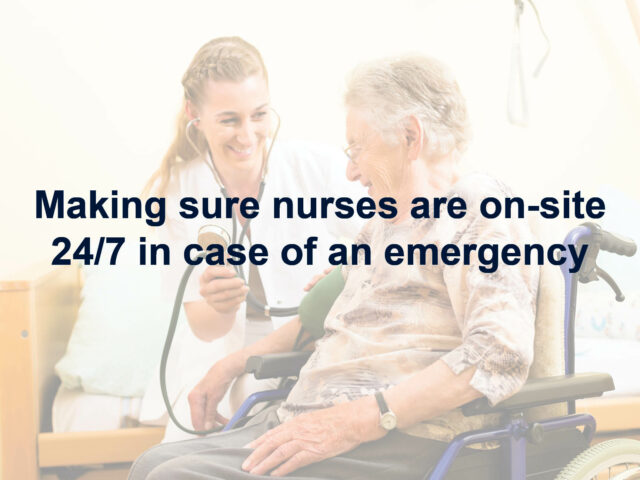
Reason 2: – Having a 24/7 Activities Calendar
When living with Alzheimer’s or dementia, stimulating the mind and body is essential to creating a better-quality life. It’s easy for Alzheimer’s or dementia patients to become isolated and overwhelmed very easily, curated activities for cognitive function can help your loved one live a better quality of life. The reason behind 24/7 activities is to intrigue every type of resident, which could be late in the afternoon or at 3 in the morning. The purpose is to have the opportunity for interaction for residents available regardless of the time. Some residents are night owls, others early birds, both have the chance to do what they want and when.
With Alzheimer’s and dementia patients, every single day is different. It’s hard to know how they will react to something or what kind of mood that day will bring. Having an activities schedule robust enough that it is intriguing but not overwhelming is important to the proper care. Memory care facilities create an active environment with skilled nurses to help guide your loved one to a better quality of life while living with Alzheimer’s or dementia.
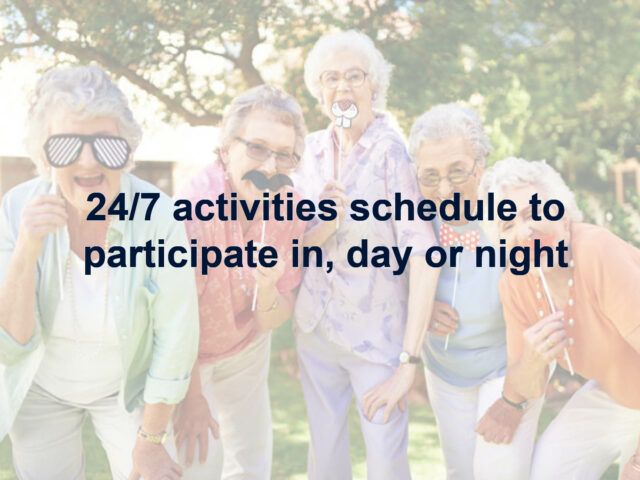
Reason 3: – Amenities Available
Memory care facilities offer opportunities one would not receive at home. Your loved one would be able to have different “perks” right down the hall unlike at home. Memory care facilities and their amenities can help to uncomplicate life, doing so by offering a sense of freedom while still being cared for. Let’s say your loved one really likes to get out of the house and explore different things like going to the barber shop or the nail salon. Memory care facilities offer amenities like those to bring a sense of normalcy to residents and gives them the independence to explore right there.
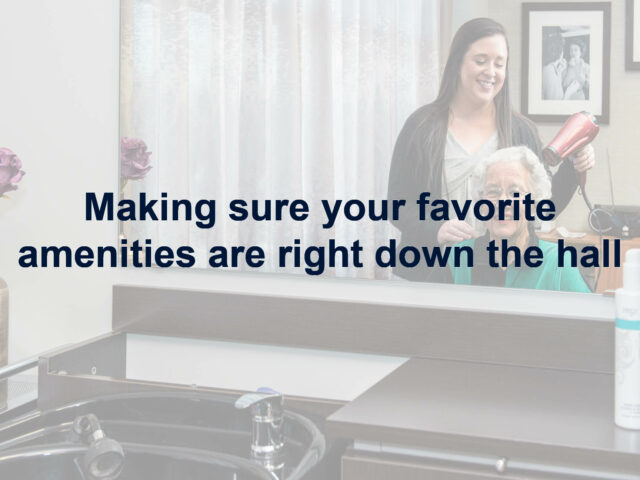
Reason 4: – Healthy Dining Program
At memory care facilities, it is very important to residents with Alzheimer’s or dementia. Usually, dementia friendly meals are served to keep residents physically and mentally healthy as much as possible. When suffering from Alzheimer’s or dementia, it’s easy to forget to eat, not remember if you did already, or become too overwhelmed. A balanced diet is important because your loved one can’t be responsible for taking care of themselves alone anymore.
Memory care facilities help monitor and create balanced meals for residents. They also give the option to not dine alone and create conversation daily while being fueled with the proper nutrition.

Reason 5: – Making it Feel Close to Home
Memory care facilities don’t have to feel like an uncomfortable place. The staff and volunteers have a wonderful gift of making it feel close to home. When moving into a memory care facility, make sure to bring similar furniture, or items that make your loved one feel at home. It’s possible they won’t remember home much, but items from the past will help to keep the connection.
At a memory care facility, they also focus on celebrating residents as well as holidays. Families can visit and there’s something to do every single day. Residents can live a better quality of life than if they were home, your loved one can meet people and have friends to socialize with while getting the assistance and care needed.
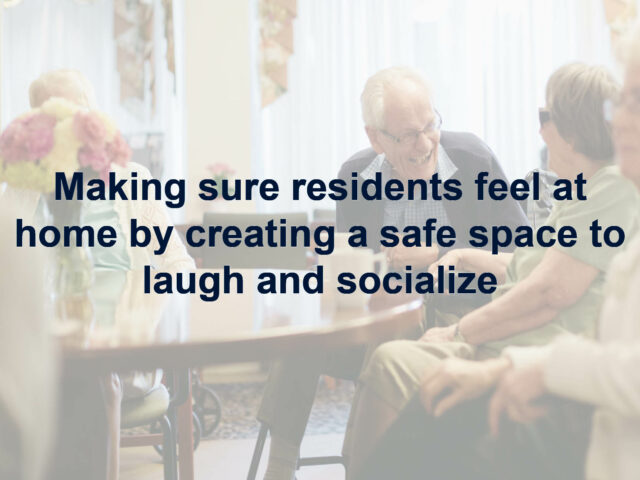
Reason 6: – Safety Protocols
The most important aspect of a memory care facility is the safety they offer. Nurses, security, and overall care can ensure your loved one’s safety. When living at home, it can be difficult to live a good quality life. Unless you or your loved one has home care, there needs to be a solution to help in dealing with Alzheimer’s or dementia. Memory care facilities will offer constant care and a community for you or your loved one to be a part of, safely.
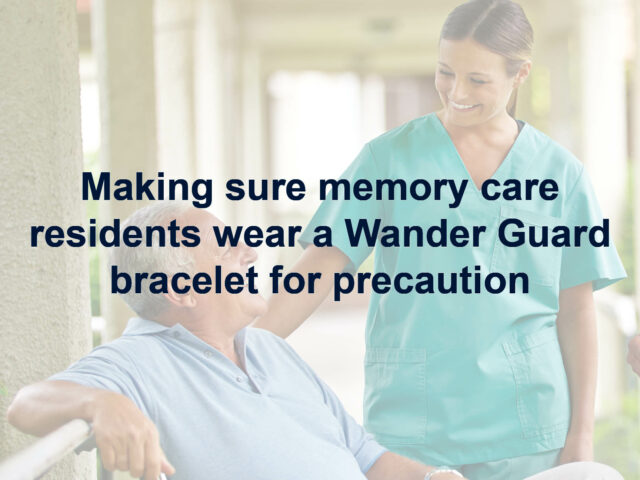
In Conclusion
When diagnosed with Alzheimer’s or dementia, having a plan is important to creating the best quality of life possible for your loved one. Memory care will help keep them stimulated, safe and sociable. As hard as it may be to come to terms with a difficult diagnosis, it’s always possible to create a path in which it’s not as scary. Memory care facilities will take you and your loved one in with open arms.
Orchard Park is known as one of the best places to live in New York according to Niche. It has beautiful parks to stroll through and the town village with shops and cafes give the town a homey feel.
Orchard Park is a place where different age groups can find multiple activities to do. Being in assisted living won’t stop you from still enjoying the city you live in if you’re able. Look into the local arts and culture of Orchard Park, and don’t forget it’s the home of the Buffalo Bills!
Take the information here and process all the opportunities memory care can give to you and a loved one. It can help to transform someone’s quality of life, while dealing with an incurable disease. There are so many opportunities for residents with the activities and amenities offered through memory care. Memory care is to help you and your loved one live a better life.
Book a tour here to see if we’re the right fit.
